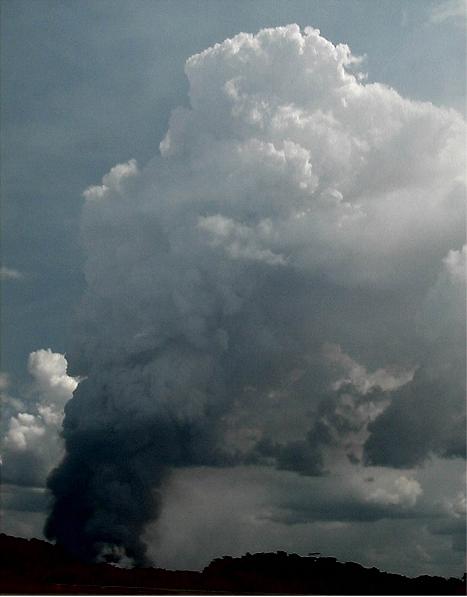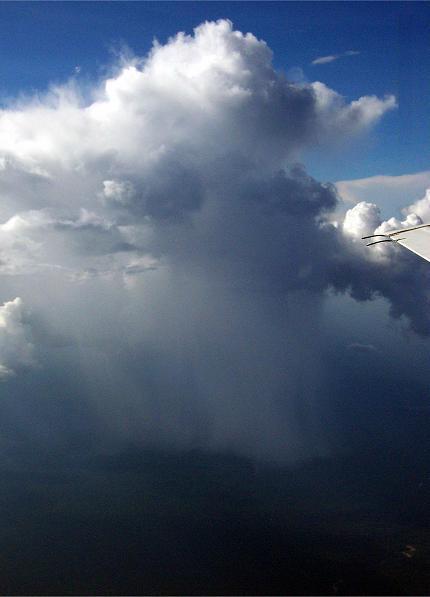The conclusion is surprising: rain can reduce air pollution or increase it, everything depends on the conditions of the local environment.

An international group of scientists led by Prof. Daniel Rosenfeld from the Institute of Earth Sciences at the Hebrew University found an answer to a question that has been troubling researchers and environmentalists for a long time - does air pollution increase or decrease the amount of rainfall? The conclusion is surprising: air pollution can reduce rain but it can also increase it, everything depends on the conditions of the local environment.
The answer to this question is of particular importance in a time of extreme climate change, and is particularly significant in areas suffering from pollution caused by human actions and in areas suffering from water shortages, such as Israel.
In an article published in the prestigious journal Science, the scientists clarify the contradictions surrounding the issue and offer a solution. As part of the research, the scientists followed the flow of energy in the atmosphere and the ways in which it is affected by aerosols - small particles floating in the air, some of which are created naturally and a large part of which is created as a result of air pollution. Through the monitoring, it is possible to calculate how air pollution will affect the weather, water resources and the climate in the future.
Humans release huge amounts of tiny particles floating in the atmosphere into the air. Before the air was polluted as a result of human activities, the air above the ground contained up to twice as many aerosol particles as the clean air above the ocean, while today this proportion is ten times greater.
It is known that aerosols affect our climate but until now it was not known what the direction of their influence was. Some researchers claim that the aerosols produce more clouds and more rain, while other researchers claim the opposite. The unclear effect of the aerosols on the climate is the main source of uncertainty in understanding the climate mechanism, including global warming.

The results of the study show that both sides are right: as air pollution increases, the amount of precipitation increases until it reaches a peak and then drops off with very high concentrations of aerosols. That is, in relatively clean air, adding aerosols up to a level that releases the maximum energy from the atmosphere actually increases precipitation. However, beyond this point, increasing the amount of aerosols will result in reducing the amount of precipitation. Hence, in places with a high level of aerosols in the atmosphere, the continuation or accumulation of the described conditions can lead to a decrease in the amount of rain.
Cloud droplets will not form without aerosols. The aerosol particles serve as collection points for moisture in the air and cloud droplets condense on them (as dew forms on cold objects when the humidity is high). Therefore, in clean air containing a small concentration of particles, a few large cloud droplets will form that can coalesce quickly into raindrops. The more polluted the air, the higher the cloud will have to rise in order for the drops to reach the size needed for the purpose. When the target occurs at heights where the water freezes and forms snow and hail deposits, instead of creating rain, additional energy is released which increases the strength of the cloud and therefore also the amount of precipitation. However, severe air pollution pushes the clouds higher so that a larger part of the cloud water evaporates instead of turning into rain.
Prof. Rosenfeld notes that "these results have great significance for countries like Israel where the rains are not abundant. Due to the relatively low temperatures in winter, overproduction of aerosols can reduce rainfall. Our research can be used as a red light for all those responsible for monitoring the pollution that humans release into the atmosphere."

3 תגובות
This is a very interesting topic! Are there other detailed sites on the subject?
This article reminds me of a topic that was brought up for discussion at the "Chalam Sages Conference" back then, yes today.
Both and - superposition
Surprising as many studies examining the effect of different substances or habits as causes of diseases and health damage.
For some studies the answer is positive and for the rest it is negative.
The aforementioned research initiators could have received twice the budget if they had acted this way.
What it means that they are more honest and fair than the others is hard to know.